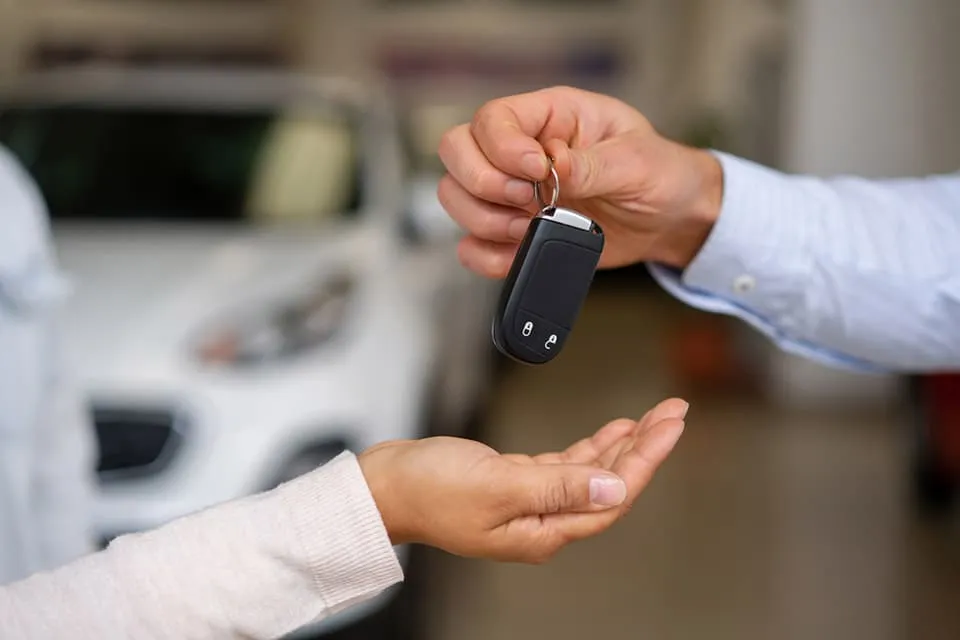Car Trade-In Guide: Get the Most Out of Your Old Vehicle

Buying a new vehicle is exciting, and choosing the model, equipment, and manufacturer that's right for you can keep you satisfied on the road for years to come. But what about the car you are leaving behind? If you think, "well, I'll just sell it!" hold that thought; there is a way you could get far more value out of an old vehicle while drastically reducing the cost of your new one: trading in. A trade-in car can save you thousands off your new vehicle, and the process is relatively simple.
How to Trade-in a Car
There are a few steps to follow when trying to trade in your car so you can get the best deal possible. You'll want to know your vehicle inside and out before you attempt a trade-in; the more information you have, the stronger your negotiating position will be when you talk to a dealership.
Get a Vehicle History Report
Before you try to enter any trade-in negotiation, you'll need to research everything you can about your car. A vehicle history report can help you understand your car's true value by showing you details like:
- Title Records
- Junk/Salvage Records
- Insurer "Total Loss" Records
- Pricing
- Sales History
- Problem Checks
- Auto Specs
- Location History
- NHTSA Crash Test Ratings
- NHTSA Recalls
- Awards and Accolades
- Manufacturer Information
With this information, you can determine whether a dealership is offering you a fair price for your trade-in car or trying to undercut you to make a profit.
What is the Trade-in Value of a Car
By consulting pricing guides like Kelley Blue Book, you can find how much your vehicle is currently worth based on a variety of different factors, the most important of which is your car's condition. Kelley Blue Book places vehicles in one of four categories: Poor, Fair, Good, and Excellent.
Poor Condition: A car in poor condition likely has a massive amount of damage or issues with its external and internal mechanics. Many vehicles in this category have next to no value, and there is almost no chance that a dealership will accept this car for trade-in. Some dealerships will have specific events where they'll take these cars, called "push, pull, or drag" sales, but you will probably get a very small amount of money off of your new vehicle.
Fair Condition: While in slightly better shape than a poor car, a vehicle in fair condition will still have its fair share of problems. A fair car does need to be in "reasonable running condition," according to Kelley Blue Book, but that can include significant damage to many of your vehicle's systems and aesthetics. This vehicle also won't get you much in a dealership trade-in.
Good Condition: A car in good condition may have a couple of minor defects but should basically be in proper working order. There can be a bit of rust and wear on the tires, but most repairs should be small and cost-effective. While not as valuable as a car in excellent condition, a good car should still be able to get some of the asking price knocked off of your new vehicle.
Excellent Condition: This is the optimal condition for your car to be in. An excellent vehicle should essentially be like new. There should be no damage to the interior or exterior, all mechanical systems should be in perfect working order, and the vehicle should be free of leaks and defects. An excellent car will fetch the highest price at a vehicle trade-in and will likely save you a significant percentage of your vehicle purchase.
Once you know your car's condition, enter it into an appraisal site along with the information you received from your vehicle history report. This can give you a rough idea of your car's worth and help when you get quotes.
Get a Few Different Quotes
Contact several dealerships in your area and speak with a representative about your interest in their trade-in program. These representatives will usually ask for a few pieces of information, including:
- Driver's License
- Vehicle Registration
- Proof of Auto Loan Payoff
- Vehicle Title
- Bill of Sale (If purchased used)
The reason you'll want to get a few separate quotes is due to the different criteria dealerships use for trade-ins. You may get a better price at one place than you can at another, so it's always best to shop around for offers.
Select Your Best Offer

Once you've compiled all your available quotes and offers, choose the dealership with the best price and approach them about an appointment. You'll meet with one of their representatives who will assess your vehicle and confirm the quote you received. Then, you will have an opportunity to negotiate. If you believe your car has more trade-in value than what is being offered, speak up! These prices aren't set in stone, and negotiating can save you hundreds or thousands of dollars on your new vehicle.
Complete Your Trade
Once you are happy with the price and your trade-in terms are set, it's time to close the deal. The value you receive for your trade-in car will be deducted from the total price of your new vehicle, leaving you to either pay it in full or make payments over time. It's possible your trade-in could be worth more than your new vehicle; in that case, you will receive a check from the dealership for the difference.
Trade-in a Car: Pros and Cons
There are advantages and disadvantages to trading in a car, just like selling it to a dealership or privately. What option you choose will depend on whether you want another vehicle immediately and how much money you are hoping to get for your old car.
Pros of Trading in a Car:
- Easier: Trading in a car is a far simpler process than selling it yourself, which involves advertising, meeting buyers, and extensive haggling.
- Reduces Your Monthly Payments: If you choose to go with a lease or loan after trading in, your monthly payments can be far more affordable.
- Less Paperwork: Dealing with paperwork is a huge hassle; with a trade-in, the dealership will handle most of this annoying process for you.
Cons of Trading in a Car:
- Less Money: Because the dealership handles most of the pain points associated with selling a car, they won't give you the full value. You can usually make more in a private sale.
Limited Choices: Trading in a car means that the value from your used vehicle has to go back into their lot. You will only be able to get another car from that dealership's available inventory, so if you had a particular model in mind, you might be out of luck.
Car Trade-In Frequently Asked Questions
How Does a Car Trade in Work If You Still Owe Money?
If you want to trade in a car with an active loan, you'll need to make sure you have positive equity on the vehicle. This means that your car is worth more than the remaining balance of the loan. If your vehicle has negative equity, you'll have to pay whatever the difference is between its current trade-in value and the balance left on your loan.
You'll need to bring all loan information with you to the dealership, including the remaining balance and account number. From here, the car's loan will be taken over by the dealership and paid off so they gain ownership. Dealerships will usually handle all associated paperwork, most notably the title transfer.
Is it Worth it to Trade in a Car?
If you don't want to deal with the hassle of listing a vehicle, dealing with buyers, and completing all the paperwork associated with a private seller, trading in your car can definitely be worth it. While you might get slightly more from a sale, a properly negotiated trade-in should drastically reduce the price of your new vehicle.
At What Mileage Should I Trade in My Car?
The higher mileage you have on a vehicle, the more wear-and-tear and depreciation it has likely experienced over its lifetime. Cars with lower mileage usually have a higher trade-in value, so it's always best to trade a vehicle in before the number on your odometer gets too high. A good rule of thumb to stick to is to stay under 100,000 miles. Hitting this milestone usually comes with a drop in perceived value and can make negotiating a lucrative trade-in more difficult.
Is it Smart to Trade in a Car that isn't Paid Off?
If you owe more on your loan than the current value of your car, it probably isn't the smartest idea to try to trade it in. You'll want to pay your loan off in full to have a hope of getting a decent trade-in value, as many dealerships have a certain set of criteria that needs to be met before they'll consider taking a vehicle. If your vehicle is worth more than the remaining balance, known as positive equity, then it's much more likely a dealership will be interested.
Is it Illegal to Trade in a Car with Problems?
It's not illegal to trade in a car with issues, and some dealerships will be fine with accepting a trade-in on a car in good or even fair condition. The issue comes with getting a good value; if your vehicle has easily fixed issues, it's always better to repair them before trying to trade the car in. Even small repairs can drastically increase your trade-in value and help you get a much better deal on your new car's price.
Can You Trade in a Car That Won't Run?
While it's not a common practice, some dealerships will take junk cars during special events. This is mostly to bring in new business but also helps dealerships net small amounts of profit by purchasing the cars for pennies on the dollar. For the most part, it's not worth the cost of hauling a car to a dealership to trade it in. You won't get very much money, and they may even reject your vehicle once they see its true condition.
FREE Vehicle Search
- Accidents
- Problem Checks
- Title Records
- Recalls
- Values
- Specs
-
InfoPay, Inc. (dba GoodCar) is an Approved NMVTIS Data Provider
-
-

















